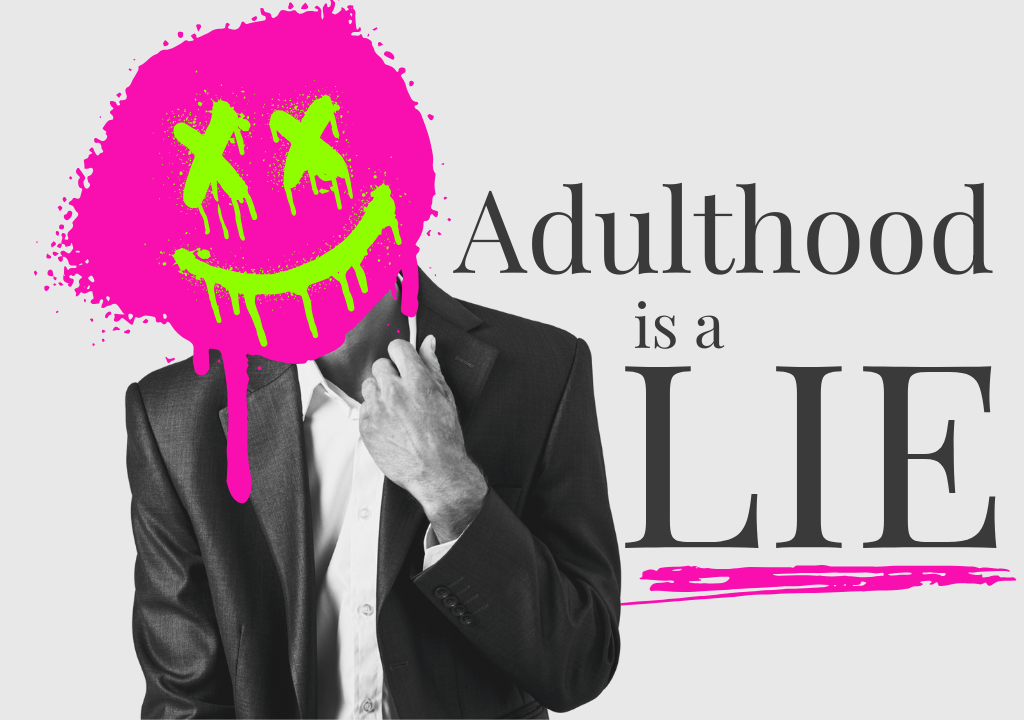Scamming a Generation
How Nostalgia Became a Trap We Pay to Stay In

A few months ago, I stood in the bedding aisle of HomeGoods, holding a weighted blanket in my hands. It was fifty dollars. Reduce your anxiety, the packaging promised. I don’t remember when sleep became a $50 problem, but there I was, debating whether I should buy something designed to pin me to the mattress like a coddled toddler.
I bought it.
I slept better.
And that, I think, is the entire economy now. The world is unbearable, so someone figured out how to charge for comfort. A whole generation, handing over money for the privilege of feeling like children again. Weighted blankets. Cozy video games. Soft lighting. Softer clothes. Tiny, manageable joys in a world that refuses to be manageable.
For a while, I thought this was just nostalgia. That’s what everyone says, right? That people my age—whatever age that even means anymore—are obsessed with childhood. They point to adults walking around with Pokémon keychains and say, See? No one wants to grow up. But that’s not really it, is it?
People aren’t regressing because they want to. They’re regressing because they’re out of options.
Adulthood was supposed to come with a blueprint. Work hard, get the degree, secure the job, buy the house. Stability, if not happiness. That was the deal.
Except now, that structure has crumbled.
Rent is higher than a mortgage, but mortgages are unobtainable. The college degree that was supposed to be a golden ticket is just another bill collector. The jobs that once promised security demand longer hours for paychecks that haven’t kept up with the cost of living. And that’s if you can even get a job in the first place.
So people stop trying. Not in a dramatic, headline-grabbing way—no protest, no declaration—just a quiet shift. They step back. Turn inward.
A 25-year-old opens a package and presses a stuffed animal to their face, feeling something they can’t quite name. A 30-year-old moves back home and calls it temporary, even though they know it won’t be. A 40-year-old streams an old Disney movie for her kids, but they’re busy on their own screens.
And maybe that’s the thing—no one notices. No one noticed when working a full-time job stopped being enough. No one noticed when ambition became an expensive hobby. No one noticed when “just buy a house” became a punchline or when “work hard” turned into advice that only works if your parents paid your rent.
People aren’t nostalgic. They’re exhausted.
And exhaustion makes the past feel like a refuge.
You see it everywhere. Adults wrapped in Snuggies like security cocoons, playing cozy simulation games where life is predictable and kind. Politics shifting toward strong leaders who promise to make things simple again. Strong fathers. Nurturing mothers. The entire political spectrum reduced to parental figures, because no one wants to be responsible anymore.
And who could blame them?
The cost of living has outpaced wages to the point that basic survival feels like a scam. The climate spirals, the news cycle churns with endless tragedies, and the idea of stability is so laughable that adulting has become an ironic punchline. We joke about burnout and doomscrolling as if they aren’t genuine afflictions. We call it escapism, this retreat into old comforts, but in reality, it’s a recalibration. When the world refuses to make sense, the logical response is to find the last place that did.
That’s why everything is a reboot, a remake, a reimagining. We crave stories we already know the ending to. The soundtrack of childhood—cartoon jingles, old theme songs, the tinny opening notes of a video game from 1998—becomes the only reliable thing in a world that refuses to stabilize. It’s more than entertainment; it’s the aesthetics of safety.
But now, the past isn’t just being repackaged. It’s being engineered.
The algorithms don’t just suggest nostalgia; they manufacture it. AI resurrects beloved characters for movies they were never meant to be in. It writes stories in familiar voices, feeds us TikTok clips of old cartoons, generates music that sounds like the theme songs of our childhoods. The same companies that sell us childhood comfort are designing algorithms to keep us inside of it.
We are, quite literally, being trained to live in a curated past.
It’s already happening. AI influencers with vaguely familiar faces. Deepfake celebrities reviving franchises long after their original stars have died. Social media feeds fine-tuned to keep us in a loop of old memes, old shows, old comforts. They don’t want us looking forward. They want us looking back—because back is predictable. Back is profitable.
And why struggle when an algorithm can curate the perfect, comforting past for you?
Why confront an unpredictable world when you can live inside a carefully engineered nostalgia loop?
At some point, the bubble will pop. The bills will come due. The politics will shift again. And when that happens, will we be ready?
Or will we be too comfortable to notice?
It’s not wrong to seek comfort. It’s not foolish to long for safety. But at what point does self-care stop being care and start becoming another industry selling people the illusion of control? When corporations that contribute to burnout start offering burnout retreats, when work schedules that destroy sleep patterns are offset by $200 meditation courses, when stress itself becomes another revenue stream—who actually benefits?
We pay for relief, but we never pay enough to change the system that made us need it in the first place.
Maybe that’s the real con.
But here’s a nugget to chew on: nostalgia only works if we never look too closely. If we don’t ask why the system is built this way, who profits from our exhaustion, who is keeping us stuck in the past because the future is too uncertain to sell.
So what do we do?
We have to start noticing. Noticing who controls the narratives we consume. Noticing how algorithms shape what we see, what we remember, what we long for. Noticing when nostalgia stops being a comfort and becomes a trap.
And then, maybe, we start imagining something new.
The future doesn’t have to be a scam. It doesn’t have to be a collapsing economy wrapped in childhood aesthetics. But we have to build it ourselves—because if we don’t, someone else will build it for us. And they’ll make sure it looks a lot like the past.
The other night, I sat on my couch, wrapped in that same weighted blanket. I had an old sitcom playing—something I’d seen a hundred times before. It was familiar, easy, comforting.
And for a moment, I let myself have it. Because sometimes, we need to be held.
But then, I turned it off.
Because sometimes, adults need to actually be adults.

Comments ()